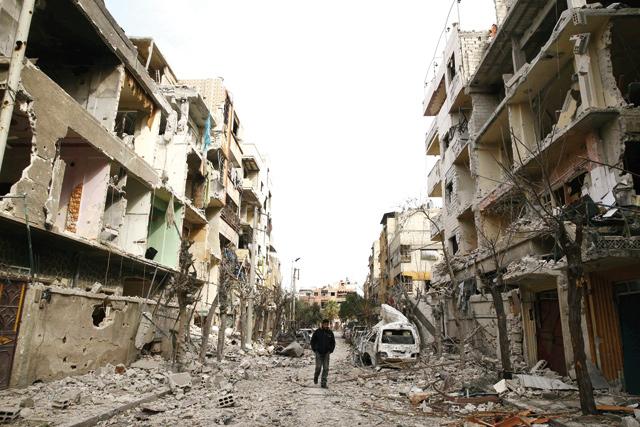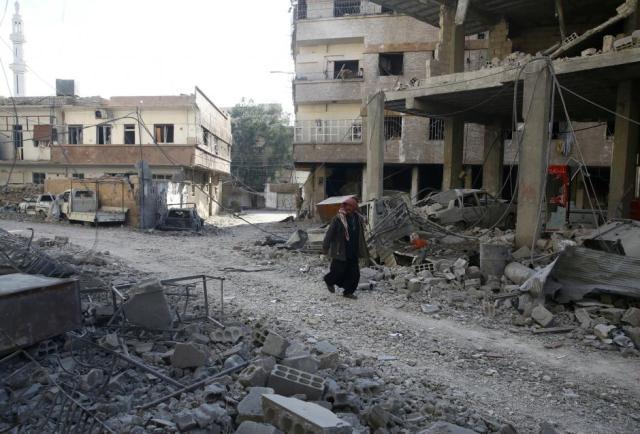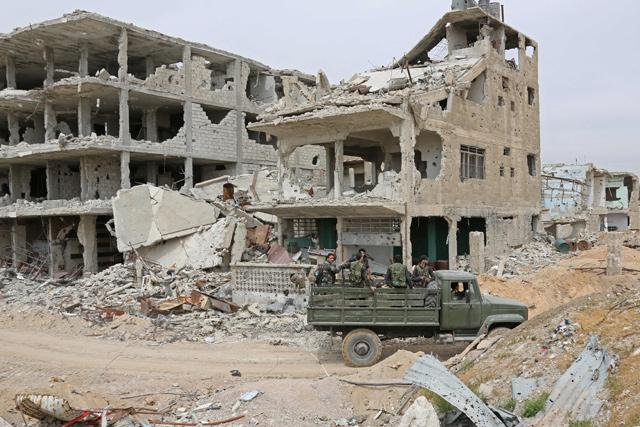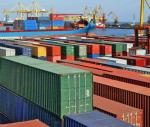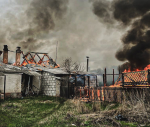You are here
Food arrives in Syria's battered Eastern Ghouta
By AFP - Mar 10,2018 - Last updated at Mar 10,2018
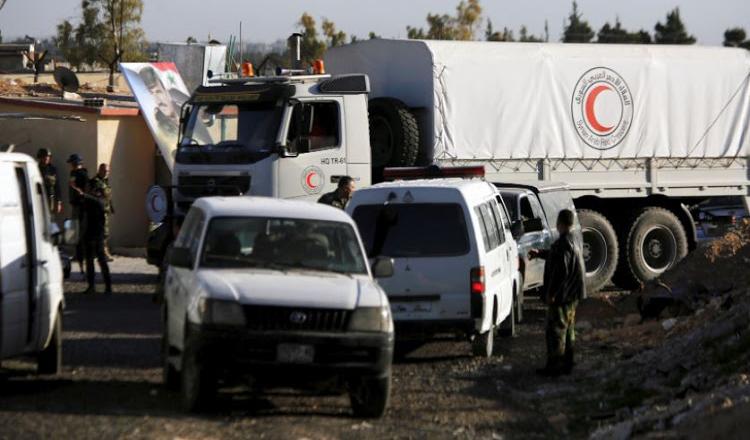
Aid convoy is seen after returning from eastern Ghouta in Damascus, Syria March 9, 2018 (Reuters photo)
Douma - The Syrian army continued its offensive against rebel-held Eastern Ghouta Saturday, a day after an aid convoy delivered food to the hunger-stricken residents of the enclave despite heavy bombardment.
Nearly 950 civilians have been killed since Russia-backed government forces launched a blistering assault on the last opposition bastion near Damascus on February 18.
Eastern Ghouta's 400,000 inhabitants have lived under government siege since 2013 and the enclave -- more than half of which has over the past three weeks been retaken by regime forces -- is home to a myriad of armed groups.
Apart from Islamist groups such as Jaish al-Islam, jihadists from Hayat Tahrir al-Sham (HTS), who are mostly linked to Al-Qaeda, are also deployed there.
Syrian state television aired footage of a single bus carrying 13 "fighters" and family members out of the enclave through Al-Wafideen checkpoint, without giving their affiliation.
Some appeared to be young, while others wore hoodies to cover their heads and faces.
The limited operation came as the powerful Jaish al-Islam said HTS fighters would be evacuated to the northern province of Idlib, in an arrangement struck following consultations with the United Nations and other international players.
"It has been agreed that the first group of HTS members be released from the prisons of Jaish al-Islam ... (and) moved to Idlib at their request," Jaish al-Islam said.
HTS is the main force in Idlib, in Syria's northwest and the last province outside regime control.
- 'Enough death' -
Civilians continued to bear the brunt of the violence on Friday with at least six killed in air strikes on the area of Jisreen, the Syrian Observatory for Human Rights war monitor said.
Thirteen trucks loaded with 2,400 food parcels, meanwhile, crossed into Eastern Ghouta, the International Committee of the Red Cross said, entering what UN chief Antonio Guterres has called "hell on earth".
But "shelling" near the enclave's main town of Douma threatened "to put at risk" the joint ICRC, Syrian Arab Red Crescent and United Nations convoy, said the UN humanitarian coordinator in Syria, Ali al-Zaatari.
The aid was delivered as helicopters hovered overhead and warplanes targeted areas outside Douma, a correspondent said.
The World Health Organization said it has verified 67 hits on medical facilities in Syria through January and February, nearly half of them in Eastern Ghouta.
The facilities hit included 20 hospitals, 16 health facilities, two ambulance stations and one medical supply warehouse.
Doctors and nurses in the enclave have run out of several life-saving items, according to Doctors Without Borders (MSF), which reported a "terrible medical catastrophe."
"Medical material is extremely limited, medical infrastructure has been hit and medical staff are exhausted," it said, adding that hundreds of people have been wounded and need urgent assistance.
In the face of the regime's Russian-backed onslaught, Ghouta's main rebel groups had so far rejected Moscow-brokered offers to evacuate civilians or any of their own fighters.
But on February 27, they said in a letter to the United Nations they would be willing to expel jihadist fighters from the enclave as soon as a UN ceasefire took effect.
That offer came on the same day as a daily humanitarian "pause" called by Moscow began, a measure which fell short of a 30-day ceasefire called by the UN Security Council late last month.
Observatory head Rami Abdel Rahman said talks were underway between regime representatives and local figures to organise the evacuation of civilians or fighters from parts of the enclave.
SANA earlier said dozens of civilians were expected to leave on Friday through the Wafideen checkpoint, an agreed exit point.
An AFP correspondent at the checkpoint said green and white trucks and ambulances were parked waiting to pick up passengers.
In the town of Hammuriyeh, dozens of people took part in a protest calling for an end to the bloodshed, the Britain-based Observatory said.
"Enough destruction and death! We want to save our children and all those who have not died," said Abu Riyadh, a 47-year-old man in the town.
- 'Colossal human tragedy' -
A negotiator from the Hammuriyeh said a "civilian delegation" wanted to hold talks with the regime to end the fighting in the area.
A tribal leader said more than 300 civilians from the areas of Kafr Batna, Saqba and Hammuriyeh wanted to leave.
He told journalists there had also been discussions for "500 fighters to hand over their weapons to the army".
Syria's war, which enters its eight year next week, has killed more that 340,000 people since it erupted in 2011 with the brutal repression of anti-government protests.
UN High Commissioner for Refugees Filippo Grandi on Friday called the conflict a "colossal human tragedy".
In rebel fire on Friday, a woman and a child were killed by a mortar round that hit the Damascus suburb of Jaramana, SANA said.
On another front, Turkish President Recep Tayyip Erdogan said his forces and allied rebels could enter the northern Syrian town of Afrin "at any moment", a day after they seized another town in the area.
Turkey-led rebels have been pressing an assault on the Kurdish enclave of Afrin since January 20.
Related Articles
DOUMA, Syria — New regime air strikes and heavy clashes shook Syria's rebel enclave of Eastern Ghouta on Sunday despite a UN demand for a ce
AMMAN - A Russian-brokered deal has been reached to evacuate a Syrian rebel group from a town in Eastern Ghouta to opposition-held nor
WAFIDEEN CHECKPOINT, Syria — Buses carrying Syrian civilians and rebels began leaving the last opposition holdout in Eastern Ghouta on Tuesd


